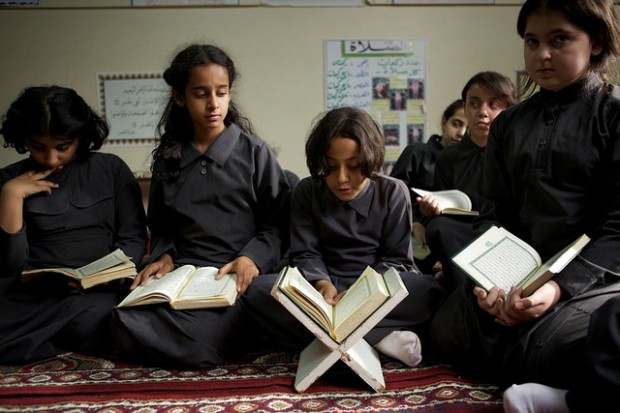You have no items in your cart. Want to get some nice things?
Go shopping“Who were the Sabians?”

That is the question posed to Wadjda’s eponymous girl protagonist by a Qur’anic quizmaster on a Playstation game called “The Qur’an Made Easy”. Audiences, like Wadjda, will be flummoxed, although classically schooled viewers may make the mistake earlier orientalists made in conflating the ancient Sabians of Arabia with the ancient Sabines of Italy.
It’s an interesting conflation. Poussin immortalised the Sabines in his painting, The Rape of the Sabine Women. In a curious way, Wadjda, the world’s first Saudi Arabian film, recalls in its tone and composition that renaissance masterpiece: they are both historic artistic documents of the brutalising effect of the laws of the ancients on the lives of women.
Wadjda is a film about the social violence such ancient laws still mete out, including polygamy (Wadjda’s mother battles the prospect of becoming a co-wife) and the enforced enclosure that stems from gender-segregation, the cornerstone of Saudi Arabia’s social architecture (even within their home, Wadjda and her mother dine apart from the patriarch and the menfolk).
Wadjda is a feisty schoolgirl with dreams of a bicycle of her own. To afford one, she flouts the rules to sell homemade jewellery at school. Then the young rebel changes her tune, literally: swapping illegal heavy metal for more sacred orations when, hearing of the generous prize money, she decides to compete in a Qur’an recitation contest. Like many of her compatriots, she realises she can make more money exploiting religious scripture than evading religious stricture. She invests in The Qur’an Made Easy as a learning aide (and finds herself wondering who the Sabians were).
As she eventually learns, the Sabians were a tiny sect of esoteric followers of John the Baptist. The comic esoterism and obscure contemporary irrelevance of this detail is part of Saudi director Haifaa al-Mansour’s gentle critique of the uses of Islam in the kingdom, so gentle it is barely noticeable. Rather than moralising, she has artfully wrapped her critique in crowd-pleasing comedy, exposing the immaturity of a martyr’s motives when Wadjda wishes for 72 bicycles in heaven, or probing the precarious honour invested in a girl’s virginity, when Wadjda falls off a bicycle and starts to bleed from her knee as her mother melodramatically prays it’s nothing more grievous.
Wadjda manages to capture something of the sexual curiosity of coming of age in a country where one’s schoolteachers teach that “a woman’s laugh is her nakedness.” Two inseparable schoolfriends are disciplined for drawing football tattoos on each other, their lesbianism hinted at – at least the fear of it – in the school’s subsequent proscription of flowers, love-notes, friendship bracelets. On the cusp of adolescence – part-way through the film she must start donning the full-length abaya – Wadjda is luridly fascinated by male-female relationships, asking her mother whether she still loves her husband, or playfully mocking the rumoured relationship between her hard-nosed headmistress and a certain illicit lover.
Children, with their innate sense of justice, are particularly attuned to such hypocrisies, to which jaded adults have become accustomed. Wadjda struggles with this inconsistency. On the one had she sees an external kingdom where women are veiled, identical, self-expression limited to footwear – Wadjda roams in sneakers and in shopping malls one hears the pointed heels of otherwise abaya-attired women. On the other hand, there is the internal reality of the home or the school, where the headmistress leers over her desk in a blouse with the top-button undone, where Wadjda’s glamorous mother, played by the unofficial Miss Saudi Arabia, Reem Abdullah, sings (with her ‘naked’ voice) to her heart’s content, looking indistinguishable from any Western women Wadjda sees on television.
In one poignantly funny scene in a shopping mall toilet, Wadjda’s mother gets out of her abaya to try on a red dress. The juxtaposition of her alluring couture and her sanitary surroundings sums up the absurd double-reality with which Saudi women must contend. Wadja is a child’s-eye view of Saudi Arabia, which both excuses its simplistic vision and heightens the power of its critique – a critique made all the more impressive for the fact it was shot entirely legally in Saudi Arabia, financed by a Prince of the House of Saud, to boot.
Aside from the film’s quality, that fact – that it is the first and only Saudi film – assures its place in cinematic history. But it is in a fascinating dialogue with it, too. The sucrose Hollywood-ending follows 90 minutes of that quietly moral gaze now so distinctively Iranian. There are clear traces of Offside, Jafar Panahi’s story of female football fans, and The Apple, Samira Makhmalbaf’s tale of two girls who escape their parents’ cellar. To say nothing of the unmistakeable nod to Vittorio de Sica’s neo-realist classic, Bicycle Thieves, also about its protagonist’s search for a bicycle.
In de Sica’s quasi-Marxist vision, the bicycle Antonio Ricci needs to work represents his economic freedom. In keeping with the tradition, Wadjda’s bicycle is just as laden with significance. It is the elusive avatar of a girl’s social freedom, the scarcest resource in resource-rich Saudi Arabia.




